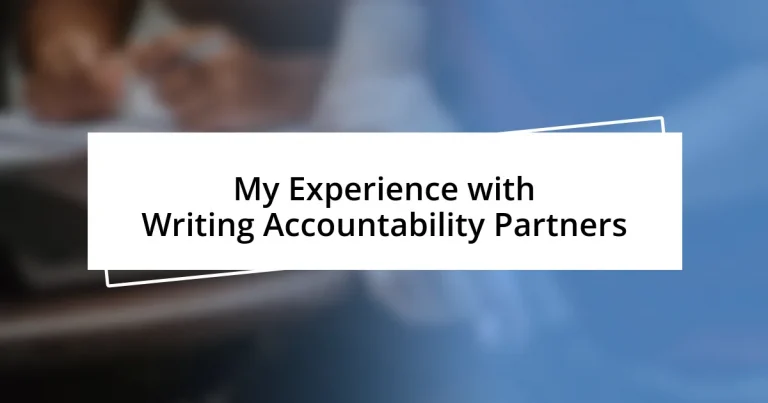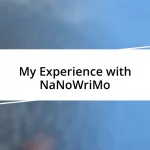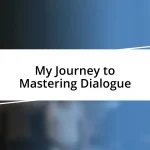Key takeaways:
- Writing accountability partners provide motivation, feedback, and support, enhancing a writer’s confidence and experience.
- Choosing the right partner involves compatibility in communication styles, commitment levels, and the ability to challenge and support each other.
- Setting clear and measurable goals together fosters accountability and progress in writing endeavors.
- Effective communication and reflection on experiences strengthen the partnership and contribute to personal and creative growth.
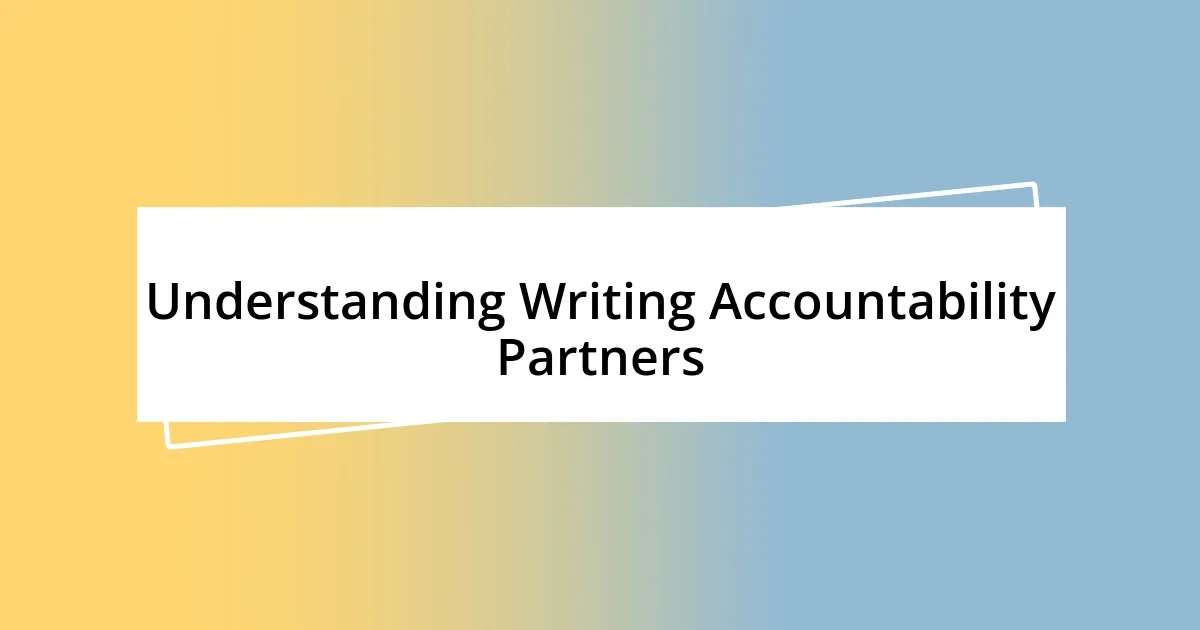
Understanding Writing Accountability Partners
Writing accountability partners serve an essential role in a writer’s journey. I remember when I first joined a writing group; the mutual encouragement we shared fostered an environment where I felt compelled to meet my goals. It was as if we were all in a supportive marathon, pushing each other to cross the finish line.
These partners act not just as motivators but also as sounding boards. Have you ever shared a piece of work and felt vulnerable about its reception? I certainly did the first time I showcased my writing. The honest feedback I received from my partner not only improved my work but also built my confidence. Knowing someone is invested in your progress can transform the way you perceive your writing.
Having an accountability partner means sharing your struggles and triumphs, creating a bond that enriches your writing experience. I’ll never forget the day my partner celebrated a significant milestone in my writing journey; that shared joy made the hard days worthwhile. If you’re considering finding an accountability partner, what kind of support do you actually need? Reflecting on that question can lead you to a partnership that truly resonates with your aspirations.
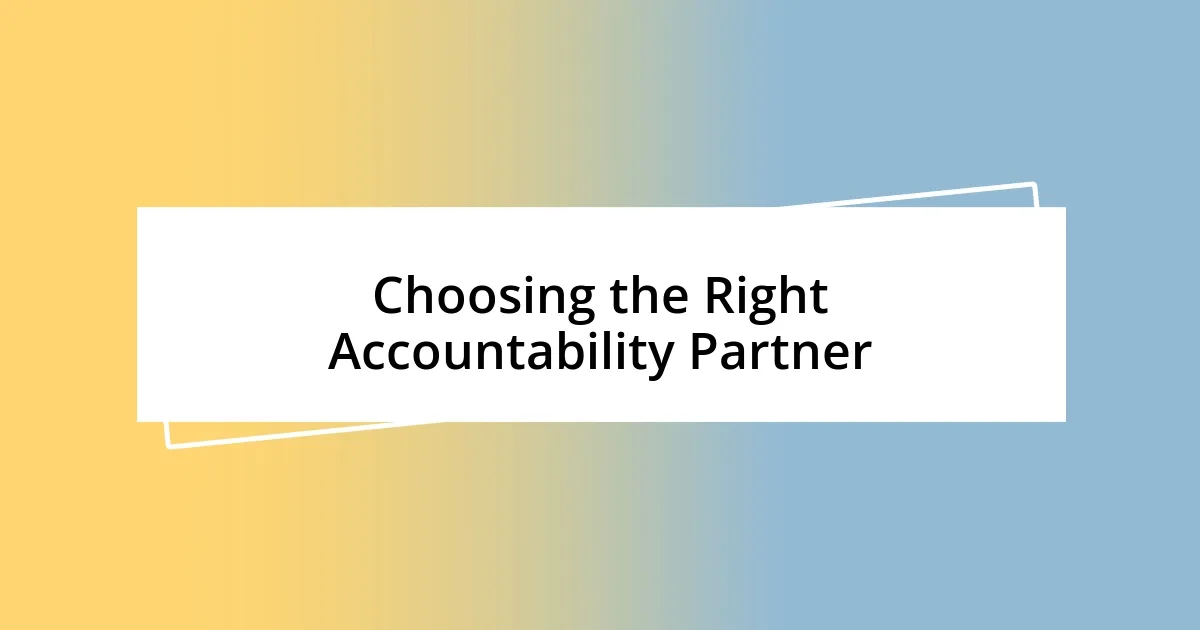
Choosing the Right Accountability Partner
Choosing the right accountability partner isn’t just about finding someone who shares the same writing goals. It’s also about mutual compatibility in communication styles and motivations. I once paired up with someone who was very analytical, which clashed with my more intuitive approach. It felt like running a race with different paces—having someone aligned with your rhythm can make all the difference.
Another aspect I consider is the level of commitment each partner can offer. I remember reaching out to someone who had grand dreams but lacked the time for regular check-ins. Our conversations became infrequent, and I felt a growing disconnect in our progress. Finding a partner who can dedicate consistent time and energy not only strengthens your accountability but also nurtures a deeper connection.
Lastly, look for someone who challenges you while being supportive. One of my best experiences came from partnering with a writer who, although very different from me, encouraged me to push my boundaries. Our honest exchanges helped sharpen my skills in ways I hadn’t anticipated. These elements all contribute to a successful partnership, ensuring that both you and your partner flourish in your writing journeys.
| Criteria | Description |
|---|---|
| Communication Style | Ensure both partners have aligned styles—collaborative or analytical. |
| Commitment Level | Choose someone who can consistently dedicate time and energy to your goals. |
| Challenge and Support | Look for a partner who pushes you beyond your comfort zone while providing encouragement. |
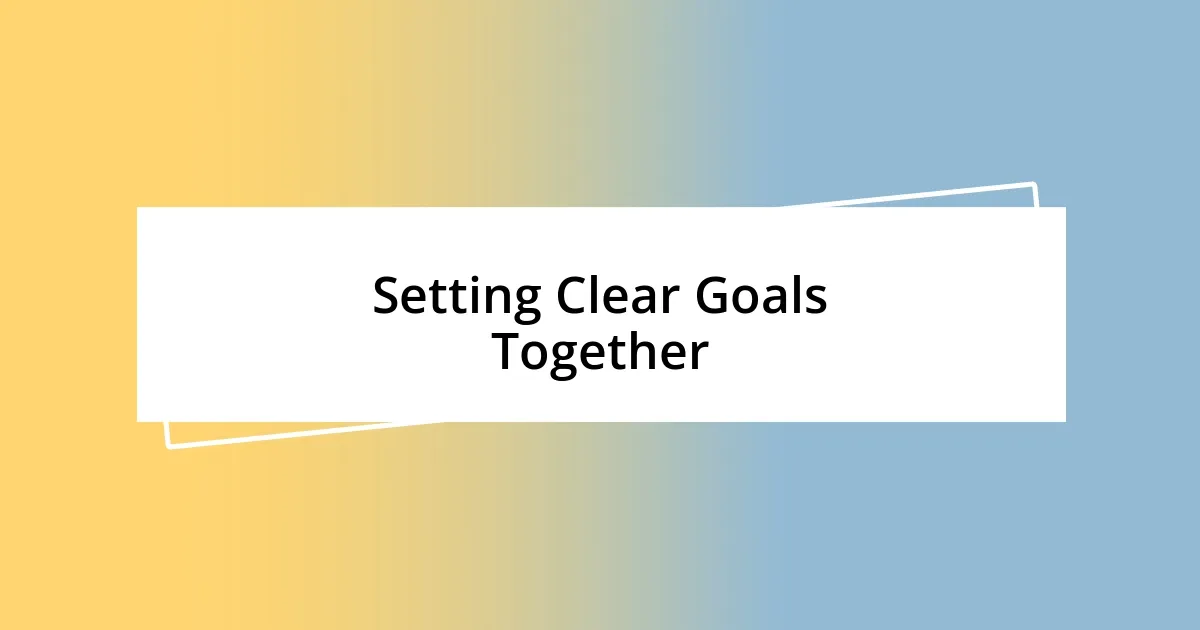
Setting Clear Goals Together
Setting clear goals together with an accountability partner can transform the writing process. Once, I vividly remember sitting down with my partner to outline specific, measurable objectives for our writing projects. We crafted a roadmap to keep us both on track. It felt empowering to know we were on the same page, driving each other forward.
Here are some key strategies that worked for us:
- Define Specific Goals: Instead of vague aspirations like “write more,” we agreed on actionable targets, such as “write 500 words a week.”
- Set Deadlines: We established a timeline for our goals, which added a sense of urgency and accountability.
- Regular Check-Ins: Scheduling weekly meetings allowed us to discuss our progress, celebrate accomplishments, and adjust our plans as needed.
Driving through my goal-setting journey alongside someone genuinely invested in my progress has made all the difference in my writing. Having that shared focus not only kept me anchored but also filled our sessions with a sense of purpose and camaraderie. It’s a reminder of the power of collaboration in achieving our dreams!
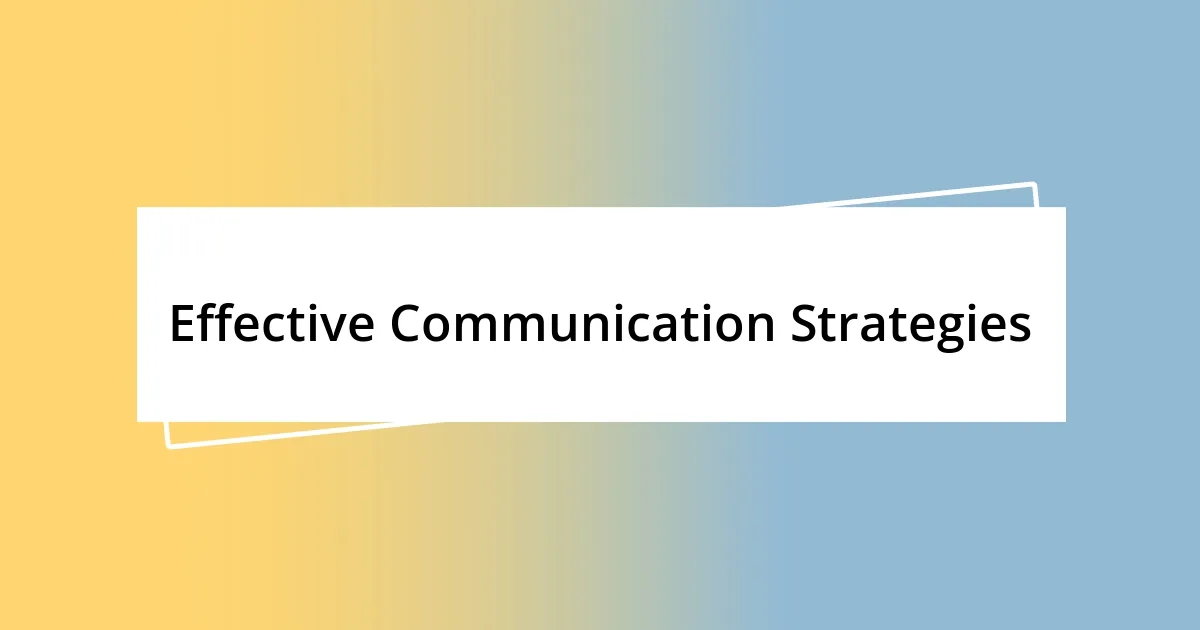
Effective Communication Strategies
Effective communication is the bedrock of any productive accountability partnership. I remember a time when my partner and I encountered a misunderstanding over feedback. It was a simple misinterpretation, but it led to a tense conversation that could have been avoided. We quickly realized that clarifying our thoughts in advance—even in casual chats—helped smooth out the bumps. I now advocate for checking in with each other after sharing critiques, just to ensure we’re both on the same wavelength.
Another technique that has proven invaluable is actively listening. I often find myself so inclined to share my ideas that I inadvertently rush through my partner’s insights. By consciously pausing and reflecting on their thoughts, I notice the depth of our discussions expands. It’s like discovering hidden gems in a conversation. When both partners practice this level of engaged listening, the collaboration flourishes and elevates both our writing journeys.
Lastly, I cannot stress enough the importance of being open and honest about progress. There was a period when I hesitated to admit my struggles with a particular project, thinking I’d let my partner down. However, once I shared my difficulties, a floodgate of support opened, reinforcing our bond. This transparency fosters a safe space for both partners, allowing for growth and learning. After all, aren’t we all navigating similar waters in our writing adventures?
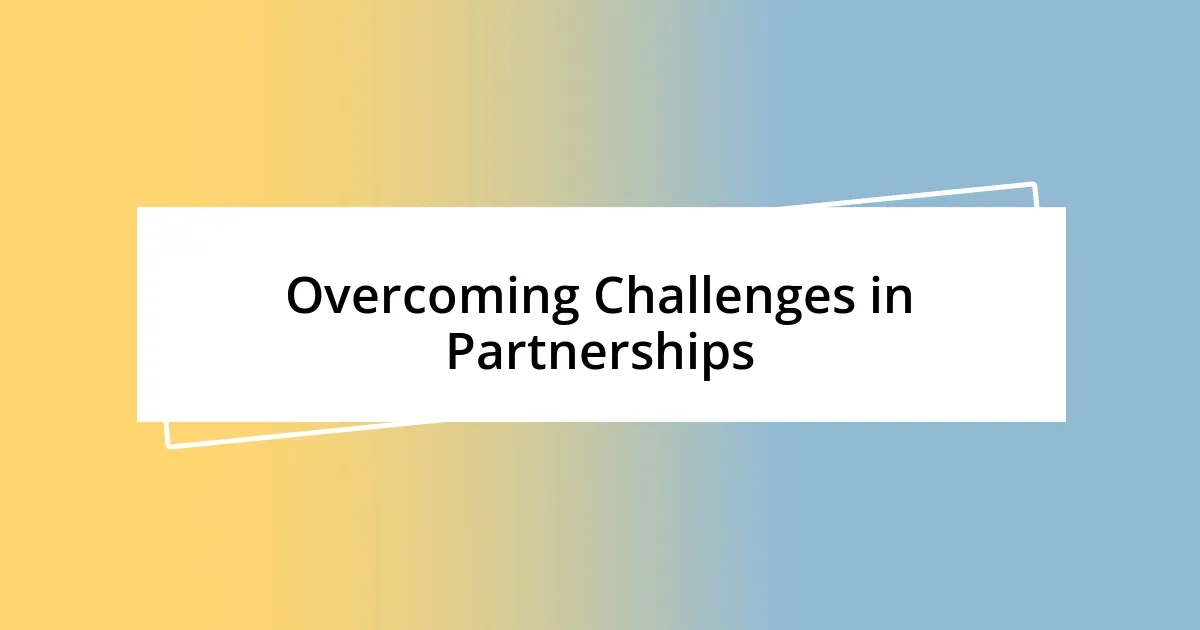
Overcoming Challenges in Partnerships
Overcoming challenges in partnerships often comes down to empathy and trust. I recall a particularly tough week when I found myself struggling to keep up with my writing goals. Instead of retreating into silence, I opened up to my partner, sharing the weight I felt pressing down on me. The relief that washed over me when I voiced my struggles was surprising. It marked a turning point in our partnership—from that moment on, we made it a point to not only share successes but also address barriers, creating a much stronger support system.
Sometimes, the hardest challenge is facing differing expectations. I remember a project where our visions clashed—my partner envisioned a structured outline, while I craved spontaneity. This tension could have derailed our collaboration, but instead, we turned it into an opportunity for compromise. By merging our styles, we crafted something neither of us would have achieved alone. Isn’t it invigorating to think that the blend of our differing perspectives can lead to unexpected creativity?
Consistency is another hurdle that can sneak up on partners. There was a phase when life got busy, and our weekly check-ins started to falter. I felt the lack of accountability creeping in, and I knew we needed to re-establish our rhythm. So, we decided to experiment with shorter, more frequent check-ins; this helped us stay connected without overwhelming our schedules. It’s fascinating how small adjustments can rekindle the momentum we thought we’d lost. Have you ever found that shifting your approach can reignite passion and commitment?
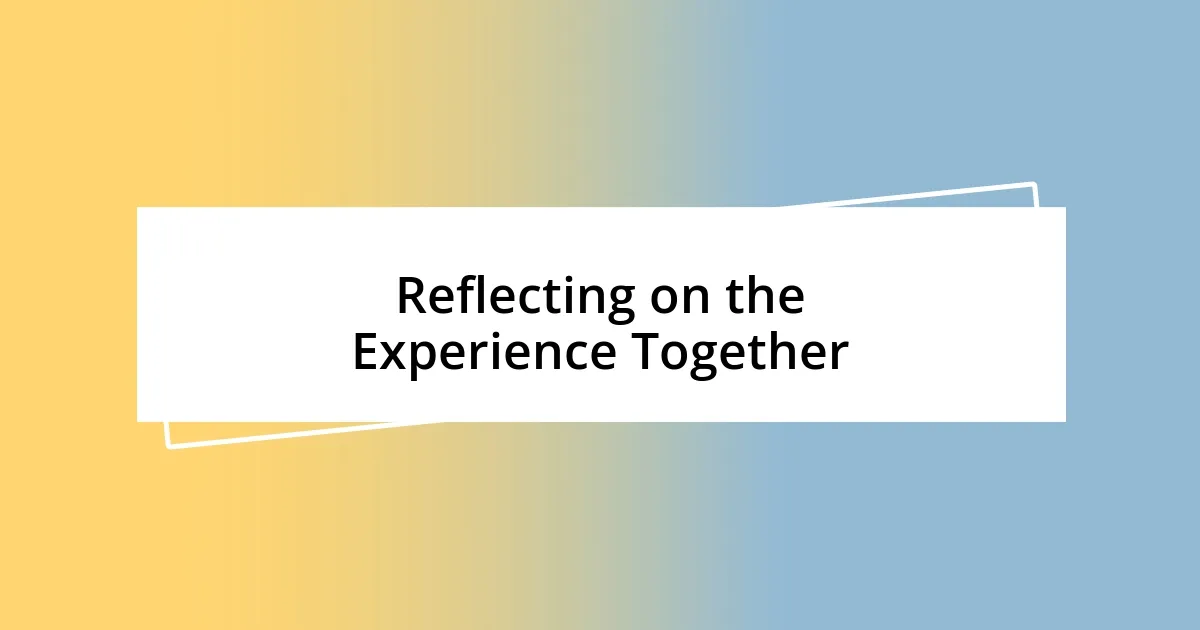
Reflecting on the Experience Together
Reflecting on our experiences as partners often takes us to uncharted territories, revealing insights we might not have acknowledged otherwise. I distinctly remember a moment when we decided to sit down and review our journey together. It was both illuminating and emotional; we shared how certain feedback had ignited new ideas and how some moments of vulnerability had strengthened our connection. These conversations made me realize that reflection isn’t just about assessing progress—it’s also about celebrating our growth as writers and as individuals.
I’ve found that these reflective discussions foster a deeper understanding of each other’s creative processes. One time, while reminiscing about how we tackled a particularly challenging piece, my partner shared how my encouragement had inspired her to push her boundaries. That moment resonated with me—I could see the tangible impact of support. It’s remarkable how our shared narratives not only boost our motivation but also reinforce the importance of nurturing our partnership through honest discourse.
What truly stands out during these reflections is the emotion that surfaces—both the pride in our achievements and the weight of our struggles. I often ask myself, “How can we harness our experiences to fuel future projects?” This mindset has transformed our reflections from a mere review of tasks to a powerful source of inspiration. Looking back together, we’ve created a foundation that propels us forward, reminding us of the strength found in collaboration. It’s a testament to the reality that every bump along the road contributes to a richer, more meaningful writing journey.












